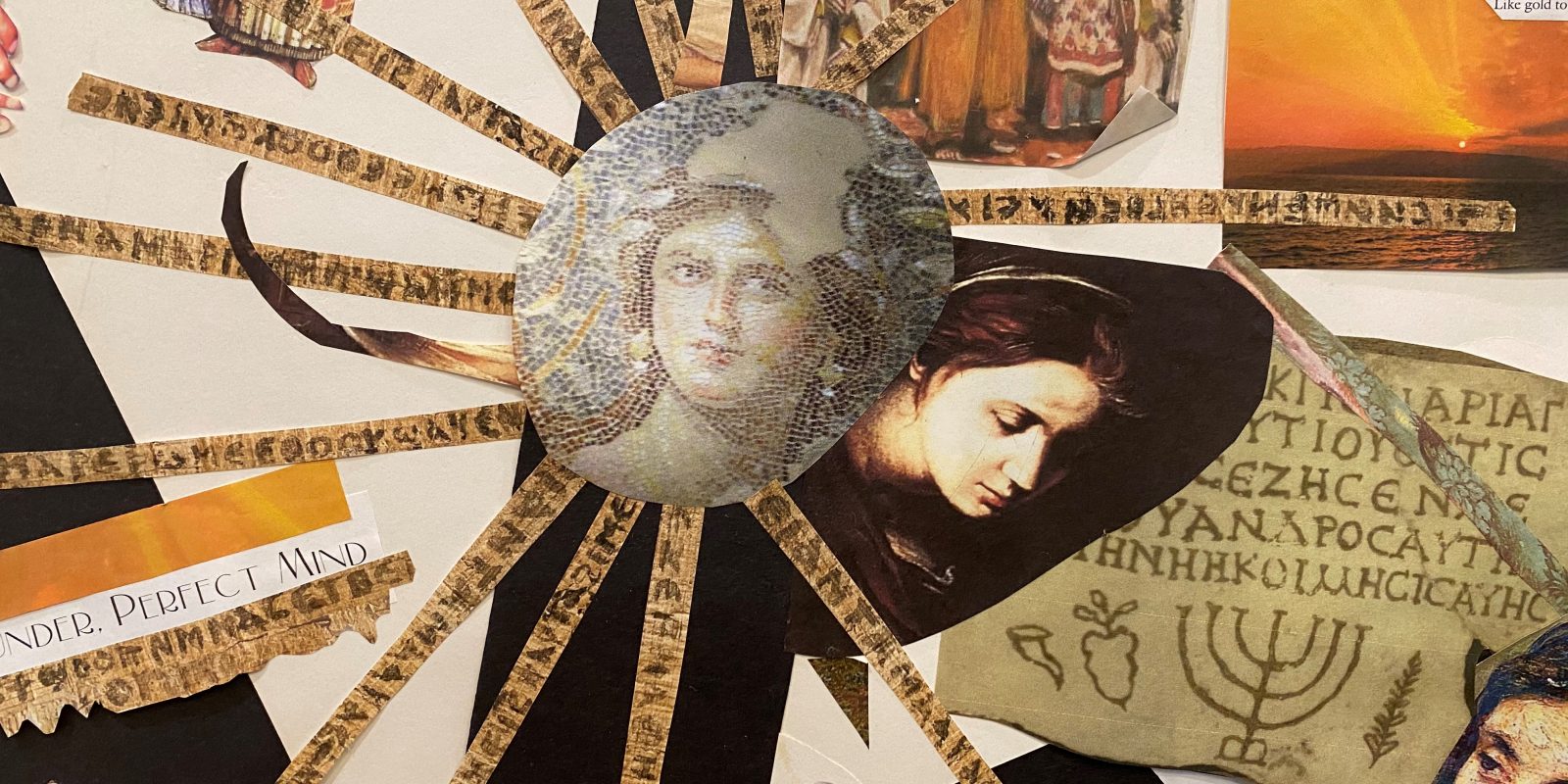
Sue Monk Kidd created a story collage to guide the plot of The Book of Longings. The mosaic at the center, known as “the Mona Lisa of Galilee,” inspired a scene in the novel. Courtesy of Sue Monk Kidd
Sue Monk Kidd Found the Courage to Pursue her Passion
The Book of Longings is the bestselling author’s latest novel.
One morning in October 2014, Sue Monk Kidd ’70 was sitting at her computer, reading a National Geographic article about an ancient manuscript that had caused a stir in scholarly circles. The fragment of papyrus, which had been obtained by a professor at Harvard Divinity School, contained the words, “Jesus said to them, ‘My wife …’ ”
Kidd looked up from the screen.
My wife?
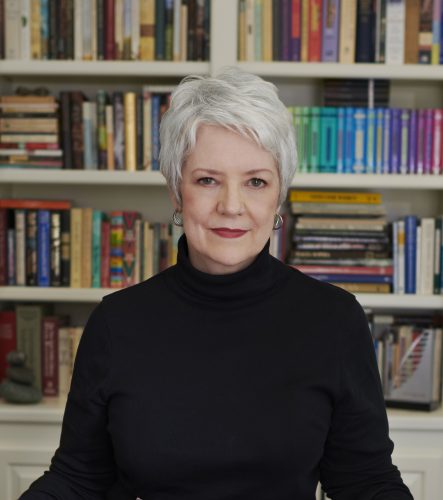
Sue Monk Kidd found the courage to pursue her lifelong dream of writing fiction and began her debut novel, The Secret Life of Bees, at 50. Courtesy of Sue Monk Kidd | Photo by Tony Pearce
The phrase provoked a host of questions. How would history have been different if Jesus had been married? Would women’s stories have been preserved alongside men’s? Would women have larger roles in the Christian church? Would sexuality and spirituality be viewed as more compatible?
If Jesus really had a wife, Kidd thought, she had been written out of the Bible. Silenced. What kind of woman would she have been? Kidd’s imagination began to whir.
In first-century Galilee, in an era when women could not travel alone or inherit property — or, often, choose a spouse — Jesus’ wife would chafe against the limitations placed on her. She would ache to make her own mark on the world. Kidd could picture the woman’s face vaguely, as though it was coming into focus.
She even knew her name: Ana.
The papyrus fragment turned out to be a forgery, but the concept inspired Kidd’s latest novel, The Book of Longings (Viking), released April 21.
The author of four bestselling novels, Kidd is best known for her 2002 debut, The Secret Life of Bees (Penguin Books), a runaway success. Her subsequent fiction has been similarly well-received: Her second novel, The Mermaid Chair (Viking, 2005), was turned into a Lifetime movie starring Kim Basinger, and The Invention of Wings (Viking, 2014) was included in Oprah’s Book Club 2.0.
Yet Kidd developed her prodigious talent for writing fiction relatively late in life, beginning Bees when she turned 50. Like Ana, she longed to pursue her true calling. Like Jessie, the protagonist of The Mermaid Chair, she wanted to “belong to herself.”
“Lord our God, hear my prayer, the prayer of my heart,” Ana, an aspiring storyteller, writes in The Book of Longings. “Bless the words I write. May they be beautiful in your sight. May they be visible to eyes not yet born. When I am dust, sing these words over my bones: she was a voice.”
In her novels about women choosing their own paths, Kidd has articulated the terror and thrill of living authentically in a way that has resonated with millions of readers. She, too, has become a voice.
Southern Girl
Kidd grew up in Sylvester, Georgia, a town of about 3,500, in a white frame house with a front porch flanked by towering camellia bushes. Bees had infiltrated the wall of an unused back bedroom, where they made honey that sometimes oozed out beneath the baseboards.
Kidd’s family faithfully attended the Baptist church twice on Sundays and again on Wednesday nights. Kidd listened to the sermons, including one by a guest preacher who explained God’s hierarchy of authority. He placed God at the top, followed by “man/husband” and then “woman/wife.” Unsettled, she wondered why none of the women in the pews seemed bothered by this arrangement.
Her father, who owned an independent insurance agency, entertained Kidd and her three younger brothers at home by telling outlandish stories with recurring characters: a mule who wreaked havoc as he went through a cafeteria line, a boy who blew enormous chewing-gum bubbles that lifted him off the ground and carried him to faraway adventures. As Kidd listened to him, her own desire to be a storyteller — something she describes as innate — flared. When adults asked her what she wanted to be when she grew up, 10-year-old Kidd answered: a writer.
But she didn’t know any female writers or how a person got paid to tell stories. One day in a high school home economics class, Kidd’s teacher wrote a list of vocations for women on the chalkboard: librarian, teacher, nurse. Not writer.
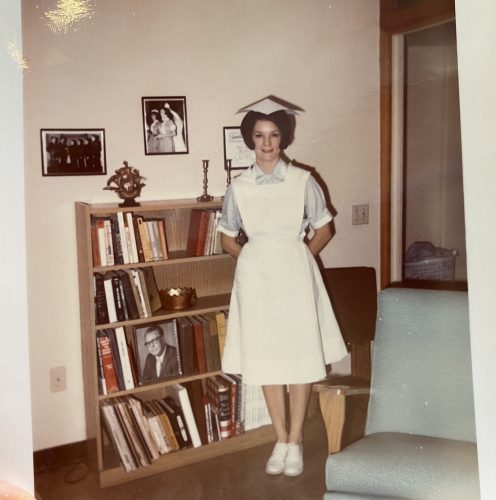
While Sue Monk Kidd had always wanted to be a writer, she opted for a more practical profession, earning a nursing degree from TCU in 1970. Courtesy of Sue Monk Kidd
Kidd began to think she should choose a more practical profession. She entered nursing school at the Medical College of Georgia in Augusta. While there, she met Sandy Kidd on a blind date to a Sunday school social. The two married after Sue’s second year of college and then moved to Fort Worth so Sandy could study at Southwestern Baptist Theological Seminary. Kidd enrolled in the nursing program at TCU.
She remembers two pivotal moments from her liberal arts courses, although the professors’ names now escape her. In a religion class, she read Ralph Waldo Emerson’s essay “The Over-Soul,” which suggested that all humanity shares an intrinsic unity, called the common heart. The idea felt like a revelation, and Kidd committed it to memory.
An English professor took her aside after class one day. “What are you doing in this nursing program?” he asked. “You’re a born writer.” Stunned, Kidd thanked him but answered that she wanted to become a nurse. The comment echoed in her head for months.
After graduation, the Kidds moved to Anderson, South Carolina, where Sandy worked as a chaplain and taught religion courses at a Southern Baptist college. Sue worked as a nurse in the obstetrical and pediatric units at a hospital. The two had a son, Bob, and daughter, Ann.
And then, at 29, she read The Seven Storey Mountain (Harcourt Brace & Co., 1948), the autobiography of Trappist monk Thomas Merton, who explained that each person has an interior life, a life of the soul. This was different from Kidd’s Southern Baptist faith, which emphasized going out into the world to evangelize.
“I felt like I discovered the inner life,” Kidd said. “I became more attuned to silence and solitude and looking within myself to discover what was in me.” Her new practice of meditation reconnected her with the desire to write. On her 30th birthday, as her husband and two toddlers sat at the breakfast table, she announced that she was going to be a writer.
Pen to Paper
How to begin? Kidd’s true desire was to write fiction, and she took courses in creative writing to develop her technique. But she still needed a paycheck, so she replaced her nursing shifts with writing for Guideposts, an inspirational interfaith magazine founded by Norman Vincent Peale, a minister and author of The Power of Positive Thinking (Prentice Hall, 1952).
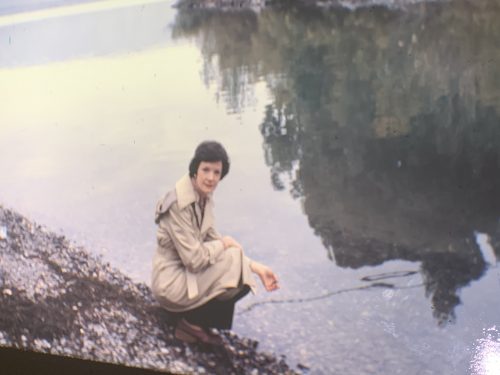
Sue Monk Kidd kept this photo of herself at the Jordan River. She traveled to Israel, Jordan and Egypt with her mother and aunt in December 1979 and January 1980. Kidd’s travel journal and photos came in handy during her writing process. Courtesy of Sue Monk Kidd
She also wrote several books about Christian spirituality, including When the Heart Waits: Spiritual Direction for Life’s Sacred Questions (HarperOne, 1990).
But Kidd was in the midst of a feminist awakening that was revealing how her Baptist faith’s exclusively male leadership and male language for God left her feeling invisible and inferior. She began attending an Episcopal church, where she also found a patriarchal system, and then dove into feminist theology and ancient mythology to search for a connection to the divine feminine.
Kidd wrote about her years-long quest for a feminist spirituality in The Dance of the Dissident Daughter (HarperOne, 1996), which was greeted with both appreciation and backlash among her Christian readership.
The urge to write fiction had never left her. “It was like that desire went into some waiting room inside of me and just waited its turn, and suddenly its turn was here,” Kidd said of her early 40s. “I was so homesick for myself.”
She focused on fiction with renewed determination.
One image, inspired by her childhood home, kept returning: a girl whose bedroom wall harbors a colony of bees that emerge at night and fly around the room.
In the early ’90s, Kidd had written the first chapter of a novel about this girl, but a teacher at a writers conference said it had little potential as a novel and would work better as a short story.
A few years later, Kidd was invited to the National Arts Club in New York City to read a short story — something Southern, the organizer suggested — and she chose the bee story. Afterward, a literary agent approached her to say, “I hope that’s the first chapter of your novel!”
Kidd expanded the story into a book and sent it to the agent, Virginia Barber, who forwarded it to editors. The phone started ringing immediately with multiple large offers. In such circumstances, manuscripts are auctioned to the publisher who makes the highest bid. Barber’s business partner, Jennifer Rudolph Walsh, ran the auction and ultimately became Kidd’s agent and good friend. Walsh now calls the two soul sisters.
“You think you understand what your life is going to be, and her whole life took such an exciting turn, and she’s just dealt with it with such grace and integrity,” Walsh said. “It truly inspires me. Working with her as her agent is one of the great honors of my life.”

Sue Monk Kidd, front center, and The Secret Life of Bees director Gina Prince-Bythewood pose with the film’s stars, left to right, Queen Latifah, Dakota Fanning, Jennifer Hudson, Alicia Keys and Sophie Okonedo. Courtesy of Sue Monk Kidd | Photo by Sidney Baldwin
The Secret Life of Bees is set in South Carolina in July 1964, just after President Lyndon B. Johnson signed the Civil Rights Act. Fourteen-year-old Lily, whose mother had died in a mysterious accident, flees from her cruel father along with Rosaleen, her Black housekeeper and surrogate mother. The two find refuge with a trio of Black beekeeping sisters who help Lily come to terms with her past.
The book sold 8 million copies worldwide, spent two and a half years on The New York Times bestseller list and was made into an off-Broadway musical and a movie.
“It was hard for me, initially, to reconcile myself to that success,” Kidd said. “It didn’t feel like it belonged to me — it was like it was happening to someone else.”
The Ties that Bind
In Kidd’s next novel, The Mermaid Chair, 42-year-old Jessie is forced to reevaluate her marriage and life when, during a solo trip to visit her troubled mother, she falls in love with a Benedictine monk.
The Invention of Wings explores the imagined relationship between abolitionist and women’s rights activist Sarah Grimke and her enslaved servant Handful Grimke as each searches for her own kind of freedom. Oprah Winfrey chose the book for her Book Club 2.0, explaining in a statement issued before the book’s release: “These strong female characters represent the women that have shaped our history and, through Sue’s imaginative storytelling, give us a new perspective on slavery, injustice and the search for freedom.”
That search — and themes of gender and race — reappear throughout Kidd’s work.
“I write about women questing for freedom, for empowerment, for voice, for a sense of belonging — usually to themselves — and for their autonomy,” Kidd said. “That has been a quest that I have taken myself, particularly in my mid-30s and through my 40s — that need and desire to come into the fullness of myself and my creative potential.”
In 2009, Kidd returned to memoir when she penned Traveling With Pomegranates (Viking) with her daughter, Ann Kidd Taylor. The book began as Taylor’s solo project, a reflection on the travels of her early 20s, but, at Taylor’s invitation, became a collaboration. In alternating chapters, Taylor and Kidd chronicle how they forged a new relationship as adult women.
By the time they wrote Pomegranates, Taylor had been reading Kidd’s drafts for close to a decade. Kidd grew to rely on her daughter’s feedback, particularly as Taylor, who wrote the 2017 novel The Shark Club (Viking), found her own writing voice and offered more focused critiques.
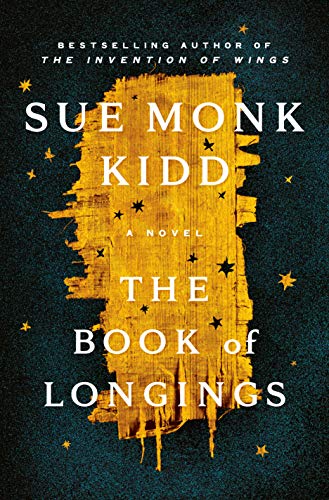
Inspired by a forged piece of papyrus, Sue Monk Kidd’s latest novel tells the story of Ana, Jesus’ wife. Courtesy of Sue Monk Kidd
When Kidd was working on The Book of Longings, she mused that she needed ways to reveal tenderness between Ana and Jesus. “Why don’t you have Ana give him a haircut?” Taylor suggested. Genius, Kidd thought. She added the scene.
Taylor reads all of Kidd’s novels, chapter by chapter, even before Kidd’s editor does.
“What I love about reading her work is that I see and sense so much of who she is — I see it in the pages,” Taylor said. “I told my son: ‘Any time in your life, you’ll be able to pick up one of Grandma’s books and be with her because so much of her work is such a reflection of her soul.’
“In Book of Longings … Yaltha [Ana’s aunt] says, ‘There is an inviolate place inside of you, and all shall be well. Bad things are going to happen, but you’re going to be well in spite of it because of this inviolate place.’ I hear my mother’s strength, and I hear her absolute belief in that. … I feel like she’s talking to me.”
Longings is a gripping read, unflinching in its depictions of the harsh, patriarchal society into which Ana was born. Readers with average biblical literacy will recognize characters and scenes from Jesus’ life, yet these thrills of discovery are tempered by a grim awareness of the suffering that lies ahead. Christian readers whose familiarity with the gospels has numbed their ability to imagine a human Jesus — one who gets tired, who sweats, who laughs — will find Kidd’s imagined Jesus intriguing, even revelatory.
“I wanted to give readers a glimpse of Jesus that was fresh, to help us see him in a new way that would feel like we’d not met him before,” Kidd said. “I have been getting a lot of comments from readers who have said they have ‘fallen in love with Jesus again.’ They use that particular phrase repeatedly. It sort of happened for me, too, in writing it, which I didn’t anticipate. It gave me not just a new look at Jesus but a renewed connection with his life and his teachings.”
The book was released in late April, as the country was shut down because of the coronavirus pandemic. Kidd’s book tour was canceled, a tremendous disappointment. But she grew to love the virtual tour that replaced it — a series of online conversations with booksellers — and the virtual book club, an experience she called almost magical because of the connections it helped her forge with readers.
On release day, author and activist Glennon Doyle, whose latest book, Untamed (The Dial Press, 2020), had been published six weeks earlier, interviewed Kidd on Instagram Live. Calling the book “a masterpiece of power and beauty and truth,” Doyle said Kidd’s work “has shown me a way of having a faith that does not require me to abandon myself.”
Heart emojis from the women’s Instagram followers cascaded across the screen.
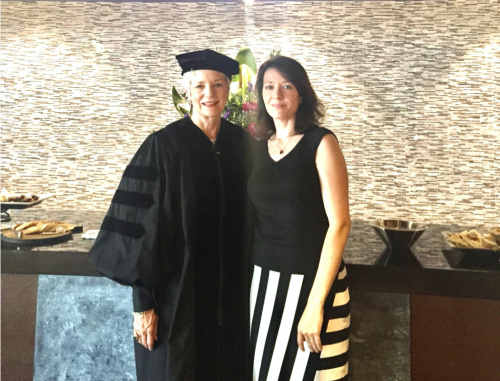
Sue Monk Kidd and her daughter Ann celebrated TCU conferring an honorary doctor of letters degree on Kidd in 2016. Courtesy of Sue Monk Kidd
Even after discovering her talent for writing fiction, Kidd struggled with the sense that creating art was a luxury. She felt she should be doing something more tangible to help others. “Early on, I would say, ‘I should be in Africa digging wells or something — why should I be sitting in my study writing?’ And then I gradually understood: This was what I was put here to do and that I could reach many people if I wrote authentically and told these stories.”
Kidd said she’s come to understand that writing serves a purpose beyond her own fulfillment. Fiction can help a reader see the world through the eyes of a character unlike herself and develop empathy and compassion for people from different backgrounds.
“I wanted to define for myself: Why do I write?” Kidd said. “I wanted it to be some larger reason than myself. And I began to think about that common heart. And I understood this was reason enough to write.”

Your comments are welcome
3 Comments
Thank you for this clarifying article about the literary artist, Sue Monk Kidd. It feels wonderful to come to know and walk with a fellow traveler on the earth whose observations and revelations mirror, enrich and deepen my own.
Thank you, Ms Kidd, for the generous gift of the labor you’ve performed in producing and publishing the truths you have discovered.
Ruth Patterson
Sandy, when we became friends an co-ministers so way back in the day, I never imagined that back there in the kitchen was the woman that I would come to know and revere as Sue Monk Kidd. Today, this afternoon, I remain in awe of the journey that has brought us to this moment.
Ed Kilbourne
Charleston, SC
11.12.24
Thank you for this in-depth look at Sue Monk Kidd’s life and work, and how they have intertwined.
Related reading:
Features
Katherine Spillar Fights for Feminism
Activist helps lead the charge for gender equality.
Features
‘Come From Away’ Inspiration Beverley Bass Tells Her Story
An American Airlines pilot got diverted on 9/11, and her story has landed on Broadway.
Alumni
Ron Hall’s True Calling
An art dealer’s story of friendship takes on a life of its own as a movie, Same Kind of Different As Me, now in theaters.